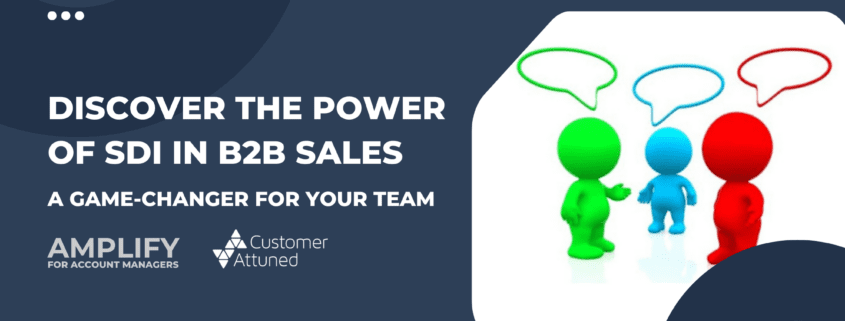Discover the Power of SDI in B2B Sales
Discover the Power of SDI in B2B Sales: A Game-Changer for Your Team
As part of our comprehensive AMPLIFY sales account management capability development program, we include the option of running a module to examine individuals’ personal working preferences, and how they can use their understanding of themselves to help assess the working preferences of their customers who they engage with.
This allows them to consider how to adapt their approach to enable them to be more effective in all areas of managing their customer relationships including relationship development discussions, negotiations, meeting plans etc.
We have written a number of articles in the past about how one such profiling tool, MBTI, can help with this process.
In this article, our newest Associate Director, Ali Archbold, shares some insights on another tool, the Strength Deployment Inventory (SDI), that stands out for its ability to dig deeply into what really drives people. This makes it a tool that any sales professional looking to up their game, or any sales leader looking to enhance team effectiveness, should consider adding to their toolbox.
What is SDI, and how can it transform your sales strategy?
The Strength Deployment Inventory, or SDI, is a personality assessment tool based on Relationship Awareness Theory, created by psychologist Elias Porter. Unlike other tools that put people into rigid categories, SDI focuses on understanding what truly motivates someone—both in good times and when experiencing conflict. It identifies three main motivational value systems (MVS):
- Blue (Altruistic-Nurturing): People motivated by relationships and helping others.
- Red (Assertive-Directing): Individuals driven by tasks, results, and achieving goals.
- Green (Analytic-Autonomizing): Those who value independence, logic, and efficiency.
We’re all a blend of these motivations, and SDI helps you see how these motives influence behaviour in both when things are going well and also when we experience conflict.
How SDI Supercharges Your B2B Sales
- Personalised Communication: In B2B sales, a one-size-fits-all approach doesn’t cut it. SDI gives you insights into a client’s main motivation, helping you tailor your communication style. For instance, if your prospect is mostly driven by Red motives, they’ll appreciate straightforward, results-focused conversations. On the flip side, a Blue-motivated client might respond better to a relationship-driven approach that emphasises trust and collaboration.
- Building Stronger Relationships: B2B sales often mean long-term relationships that go beyond the initial deal. Understanding a client’s MVS lets you nurture those relationships more effectively. A Green-motivated client, for example, will value data-driven, logical discussions that respect their need for autonomy. A Blue-motivated client will appreciate gestures that strengthen the partnership and show support.
- Handling Conflict and Objections: Sales professionals often face objections or conflicts during the sales process. SDI doesn’t just help you identify a client’s main motivation; it also reveals how their motives shift under stress or during conflict. For example, a client who usually values relationships (Blue) might become more task-focused (Red) when under pressure. Recognising these shifts lets you adjust your approach in real-time, addressing concerns in a way that clicks with the client’s current mindset.
- Improving Team Dynamics: In B2B sales, teamwork is crucial. SDI can also be used internally to understand what motivates your own sales team. Knowing your team members’ primary motives allows you to assign roles and responsibilities that play to their strengths, making for a more cohesive and effective sales team.
Bringing SDI into Your Sales Strategy
To start using SDI in your B2B sales strategy, get your sales team to take the SDI assessment. This will give you valuable insights into their motivations and those of your clients. Encourage your team to use this insight when planning pitches, handling objections, and following up with clients.
Also, think about using SDI results to spark discussions within your team. Building trust is key in any relationship, and one of the quickest ways to do that is by getting to know your team and clients—and letting them get to know you. By understanding each other’s motivations, your team can work together more smoothly, using each person’s strengths to close deals more effectively.
SDI isn’t just another personality test; it’s a strategic tool that can transform how you approach B2B sales. By tapping into what drives your clients, you can communicate better, build stronger relationships, and navigate the complexities of the sales process with more skill. In a B2B world where understanding your client is half the battle, SDI can give your sales team the edge they need to succeed.
If you would like to discuss how you could make use of SDI to help your sales teams, please get in touch and we will set up a call for you to talk to Ali Archbold who has extensive experience of using SDI with a number of clients and is accredited as a Master Facilitator for deploying SDI.
Get in touch!
- It Takes Two To Tango - May 20, 2025
- Leveraging MBTI to build successful B2B relationships - October 25, 2024
- Making MBTI Work For Sales Teams - September 25, 2024







